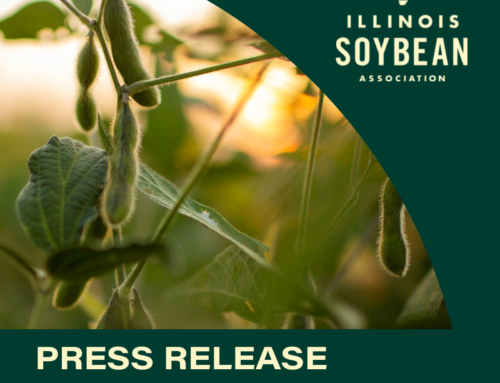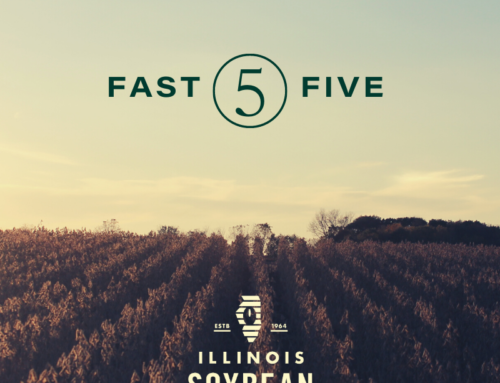BLOOMINGTON, Ill. (April 22, 2021) – Now more than ever, consumers are seeking food products with ingredients that are locally sourced and sustainably produced. Soy from Illinois is an excellent example of a nutrient-dense ingredient that meets consumers’ demands for sustainably produced food. Whether it is in the practices they use on their farms, or through the care they take when planting and harvesting, Illinois soybean farmers are at the forefront of sustainability and land conservation efforts.
“Our farmers work hard to make sure the land is taken care of. To them, sustainability is a way of life,” said Rachel Peabody, Director of Communications for the Illinois Soybean Association. “For as long as they’ve been farming, Illinois soybean farmers have taken extra steps to protect the land, air and water for future generations.”
To demonstrate their care for the land, most Illinois soybean farmers participate in national and state programs, such as the U.S. Soy Sustainability Assurance Protocol (SSAP). The SSAP is a certified approach managed by the U.S. Soybean Export Council where third parties audit soybean growers’ practices to verify sustainable soybean production. There are numerous farming innovations and practices that help Illinois farmers meet the SSAP guidelines to sustainably produce soybeans and protect the environment.
Soil is one of the most valuable resources for growing soybeans. That is why Illinois farmers are increasingly implementing practices such as crop rotation and cover crops to improve soil fertility and prevent soil erosion. Some farmers also embrace the rich soil with a low- or no-till approach to farming, a technique used to grow crops without disturbing the soil, which keeps carbon and nutrients safely stored away for the crop to utilize and reduces carbon dioxide emissions caused from tilling the soil. With the help of these practices, among others, Illinois soybean farmers have reduced soil erosion by more than 90 percent over the last 30 years.
Water is another vital resource that Illinois soybean farmers work to conserve. Precision farming technologies help farmers more precisely irrigate their soybeans, using less water. Near waterways and in significant watershed areas, farmers have been slowly releasing acreage from crop production and allowing it to return to its natural wetland state. In the last 20 years, Illinois farmers have converted more than half a million acres of farmland to wetlands.
Illinois soybean farmers are taking steps to continuously improve their sustainability performance. In fact, as part of the SSAP, soybean farmers aim to reduce land impact by 10 percent, reduce soil erosion by 25 percent, increase energy use efficiency by 10 percent and reduce total greenhouse gas emissions by 10 percent between now and the year 2025.
The Illinois Soybean Association and the 43,000 Illinois soybean farmers they represent are committed to providing sustainable, high-quality soy ingredients. In addition to the SSAP, the Illinois Soybean Association partners with non-profit organizations, such as The Nature Conservancy, American Farmland Trust and The Wetlands Initiative, as well as the Soil Health Partnership, universities, farmers, commodity groups and others to help implement new conservation programs on an ongoing basis. Today, the Illinois Soybean Association continues to seek additional partnerships to build consumer trust in the food system and promote sustainable food production practices. To learn more or discuss partnering with the Illinois Soybean Association, visit, www.ilsoy.org or contact Rachel Peabody, Director of Communications at peabody@ilsoy.org.
###
About the Illinois Soybean Association
The Illinois Soybean Association (ISA) checkoff program represents more than 43,000 soybean farmers in Illinois. The checkoff funds market development and utilization efforts to increase demand for and use of Illinois soybeans. ISA programs are designed to uphold the interests of Illinois soybean producers through promotion, advocacy, and education with the vision of becoming a market leader in sustainable soybean production and profitability. For more information, visit the website www.ilsoy.org.
Contact:
Rachel Peabody
Director of Communications
Illinois Soybean Association
Email: peabody@ilsoy.org
Erica Ballmer
Rhea + Kaiser
Tel: (630) 955-2514
Email: eballmer@rkconnect.com

